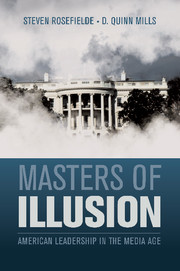Book contents
- Frontmatter
- Contents
- List of Tables and Figures
- Preface
- Acronyms
- Executive Summary
- Acknowledgments
- PART I NATIONAL SECURITY IN THE NEW AGE
- PART II AMERICAN PUBLIC CULTURE AND THE WORLD
- PART III AMERICAN PUBLIC CULTURE AND OURSELVES
- PART IV THE RECONFIGURATION OF NATIONAL WEALTH AND POWER
- PART V VORTEXES OF DANGER
- 11 A Witch's Brew of Troubles: The Next Big Wars
- 12 The Middle East
- PART VI THE AMERICAN RESPONSE
- PART VII LEADING TOWARD PEACE
- PART VIII AMERICAN PRESIDENTIAL LEADERSHIP
- Notes
- Glossary
- Bibliography
- Index
12 - The Middle East
Published online by Cambridge University Press: 31 July 2009
- Frontmatter
- Contents
- List of Tables and Figures
- Preface
- Acronyms
- Executive Summary
- Acknowledgments
- PART I NATIONAL SECURITY IN THE NEW AGE
- PART II AMERICAN PUBLIC CULTURE AND THE WORLD
- PART III AMERICAN PUBLIC CULTURE AND OURSELVES
- PART IV THE RECONFIGURATION OF NATIONAL WEALTH AND POWER
- PART V VORTEXES OF DANGER
- 11 A Witch's Brew of Troubles: The Next Big Wars
- 12 The Middle East
- PART VI THE AMERICAN RESPONSE
- PART VII LEADING TOWARD PEACE
- PART VIII AMERICAN PRESIDENTIAL LEADERSHIP
- Notes
- Glossary
- Bibliography
- Index
Summary
THE CRESCENT OF FIRE
When the World Trade Center was attacked, the threats potentially posed by Russia and China were subordinated to the more immediate terrorist menace, even though the contours of the danger were obscure. Terrorism isn't an end in itself. It is a means to ends like victory or retribution, and can take many forms from sabotage to mass annihilation. Moreover, whereas terrorism, like crime and war, involves unlawful coercion, it occupies a middle ground in international jurisprudence between them. States are permitted to suppress terrorism more vigorously than crime, but cannot act with the impunity permissible under a formal declaration of war. In this sense, war on terrorism is an acknowledgment that terror should be combated with counterterrorist methods, and a warning that America will escalate beyond this boundary to full-scale state to state war if necessary.
The dimensions of the terrorist threat are correspondingly elastic. At one end of the spectrum, demented individuals could bring about the “end of days” with weapons of mass destruction for no rational purpose, but this is a remote possibility. At the other extreme, these same individuals like Hamas could seize the reins of state, transforming themselves from outlaws like Yasser Arafat into statesmen subject to standard rules of international engagement. And, of course, terrorism could persist somewhere in the middle, circumscribed but deadly. All perils deserve attention. It is in America's interest to deter and contain. But the expected benefits don't warrant unlimited expense.
- Type
- Chapter
- Information
- Masters of IllusionAmerican Leadership in the Media Age, pp. 264 - 302Publisher: Cambridge University PressPrint publication year: 2006



